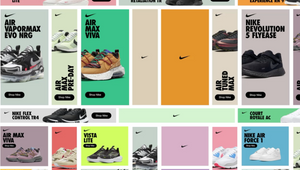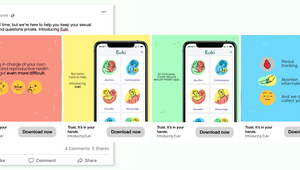
Meet Your Digital Twin: The New Gatekeeper to Customer Experience

What if each of us had an ever-evolving digital representation of our physical self living somewhere in the cloud? Imagine that these twins were built from enough data and fuelled by enough computing power that they could accurately model our behaviour. The implications are mind-boggling. A brand could launch a new digital service and use our twins to simulate every possible outcome or potential pitfall in real-time. In a sense, our twins could become the gatekeepers for many of the brand experiences we’re destined ever to have. Crazy, right?
Crazy or not, our digital twins are here. Most people just don’t know it yet.
The concept of a digital twin has been around for almost 20 years. The original twins weren’t people (people were far too complex to model). They were toasters, or ovens, or cars. In other words, they were digital replicas of real-world products, placed in hypothetical environments. Manufacturers could use these twins to respond to changes, optimise, and predict problems ahead of time.
A decade or two ago, digital twins were useful but limited—only as good as the tech supporting them. Times have changed.
With recent advances in areas such as IoT and automation, digital twins have become very sophisticated. They’re turning into the digital replicas of real physical assets that they were envisioned to be. In other words, the reality of digital twins has caught up the promise.
And now, we’re approaching a time where not just physical things, but human beings will be connected with a digital counterpart—a digital twin of our own. Of us.
Who Does Your Twin Work For?
As humans, our own digital twins will influence our day-to-day lives, as well as our relationships with brands and how they serve our evolving needs and expectations. Digital twins will therefore be caught in the middle of the never-ending battle between superior customer experiences and a desire for personal privacy. Each side—brands and people—will understandably attempt to use them to serve their own interests.
For companies, digital twins will emerge as a key tool in the endeavour to consistently deliver superior customer experience. Here are some of the places where digital twins will have an impact:
● Behavioural Insights: Developing digital twins on a customer level enables businesses to run simulations and gain insights into various customer behaviours on a more accurate and granular level. Businesses can then use twins to analyse purchase patterns for different consumers or model different promotions and marketing approaches. It’s all about having a more personal understanding of their customers and enabling products, services, and communications to be more relevant and predictive.
● Customer journeys: Digital twins have huge potential when creating and optimising customer journeys. (Companies could also develop digital twins that essentially replicate the entire company environment, offering visibility across all silos and touchpoints in the organisation.) Digital replicas will allow companies to simulate, analyse, and optimise various journeys for consumers (or any user) of interest, providing precise insight on an individual level.
● Sustained Engagement: More predictive and relevant consumer products, services, and solutions will open up the opportunity for sustained customer engagement at a time when consumers are shifting between brands at increasing rates. Delivering timely and relevant solutions can sustain customer engagement, drive deeper connections, and deliver better experiences.
For consumers, digital twins could potentially offer more control—a degree of agency over how brands market to them. Forrester Research highlights the way that digital twins will be gatekeepers to our personal ecosystems, controlling how and when companies can interact with us. With privacy and values-based ideals moulding the environment, Forrester asserts that these personally curated twins will act as a buffer, delivering only interactions and services that are desired by the individual consumer based on their personal goals at that specific time. Buying a house, having a baby, increasing our wellbeing, hobbies, interests—all of it and much more will be catered to. Our digital experiences in our personal ecosystems will be constantly and continually optimised.
Although the platforms that will provide this personal twin service are yet to fully exist, we are already seeing a raft of companies emerging that offer the promise of gaining control of your personal data, such as personal data marketplaces like Datum and Killi. It is likely that our personal twins will be provided by similar subscription based third-party cloud platforms that can sit across our existing ecosystems. The task for regulators will be ensuring that these providers are insulated from challengers that will seek a back door into consumers’ private information for company use.
The implications for customer experiences in the future are profound. With the power that digital twins will wield over individuals’ personal ecosystems and experiences, a shift will occur from a personalisation model based on behavioural indicators, such as search and ecommerce data, to a more human approach based on indicators from a personal digital twin. In this sense, consumers stand to play a more active role in the personalised communications and services they receive, using their twin to actively tailor and filter content based on their goals and desires. Companies will be able to see when twins are blocking their content, and will need to adjust their marketing efforts accordingly, balancing consumer preferences with the need for continued prospecting.
This sets up a future state where twins representing both sides of the company and customer spectrum vie to gain the upper hand for their respective objectives. Which twin will come out on top during these interactions? The answer isn’t quite clear and is likely to depend on each individual circumstance. However, with a continued push towards data privacy and regulatory restrictions, companies will increasingly have their hands tied, potentially giving the upper hand to consumers’ personal twins.
How can companies ensure that they are in service of the consumer, as well as enabling consumers’ digital twins to do more for them and become a more accurate representation? The result will be a renewed focus on trust and transparency, and a need for all organisations to become truly customer-centric on a personal level.
The takeaway for brands? Digital twins are part of an explosion of new technologies that are going to fundamentally change how we interact with organisations. Those brands who act will be able to jump out in front of their competition, differentiate themselves, and keep up with customers’ growing expectations in the pursuit of growth.
The takeaway for consumers? At a time when consumers will be generating more data than ever, digital twins can give them a greater degree of control over the types of companies they interact with and the communications they receive.
The takeaway for us all? Ethics will be inseparable from strategy. Very soon, if not already, every company will need to become a data company, with stringent governance and validation processes. With the handling of sensitive personal data and the continued focus on privacy, it’s going to be crucial to get ethicists involved at a granular level to ensure organisations understand and adhere to privacy and security rules and restrictions.
Joe Cook is strategy director at Critical Mass.













